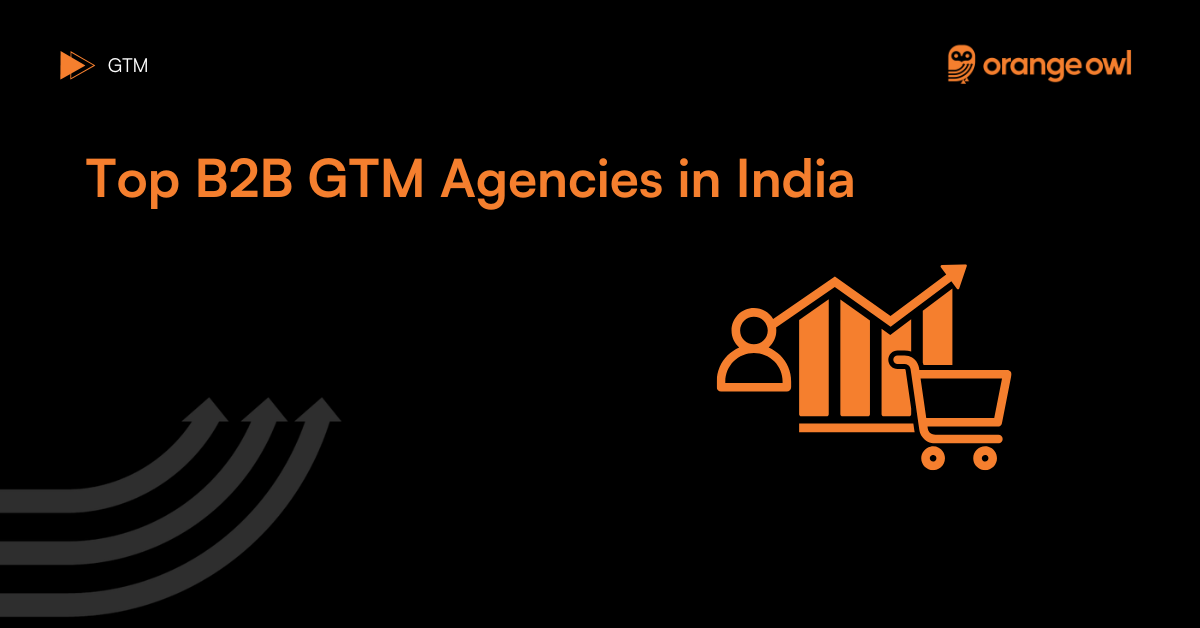Top Must-Have GTM Tools and Resources for Effective Planning and Execution
Vivek Goel
February 1, 2025
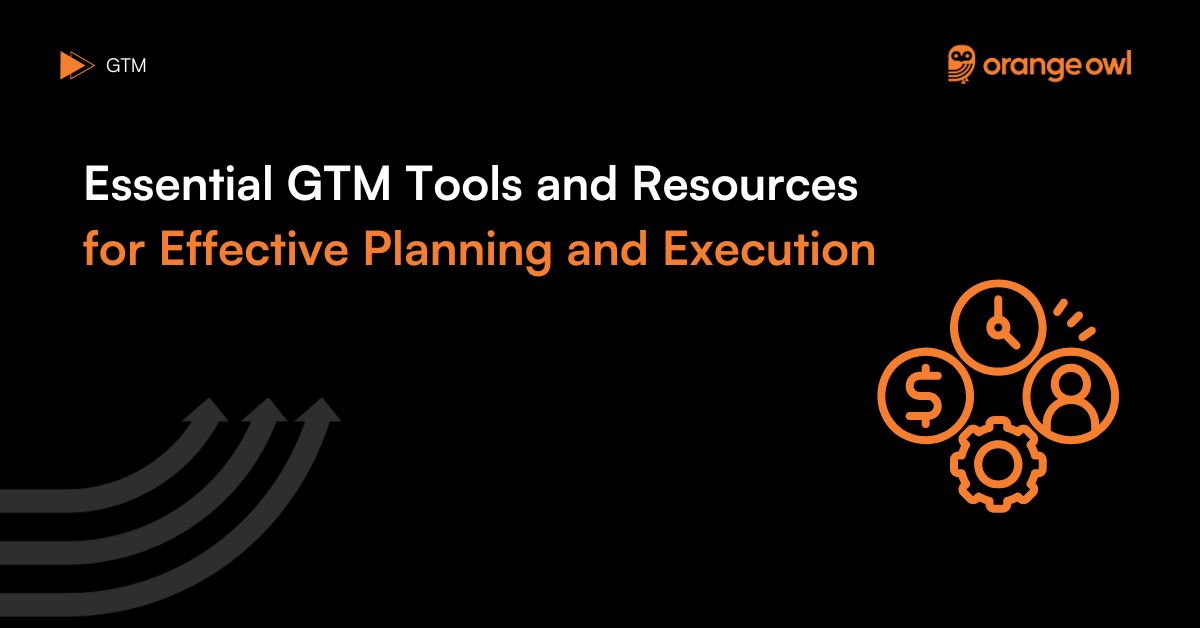
Table of Contents
Navigating the complexities of the market landscape demands not just strategic vision but also the right tools to execute a successful Go-To-Market (GTM) strategy. From market research to customer relationship management and project coordination, a plethora of tools exist to streamline processes, enhance decision-making, and drive successful outcomes. In this sub-blog, we’ll delve deeper into a curated list of top must-have GTM tools and resources, exploring their functionalities and real-life applications to empower businesses in their planning and execution efforts.
Top Must-Have GTM Tools And Resources
1. Market Research Tools
- Nielsen and Gartner: Renowned for their comprehensive market analysis and insights into industry trends, these platforms provide invaluable data to inform strategic decision-making and market positioning.
- Google Analytics and SimilarWeb: Essential for understanding web traffic patterns, user behavior, and competitive insights, helping businesses refine their GTM strategies and optimize digital presence.
2. Customer Relationship Management (CRM) Systems
- Salesforce and HubSpot CRM: Widely adopted CRM platforms that enable businesses to manage customer data, track interactions, and automate sales processes, ensuring a seamless customer journey from prospecting to conversion.
- Zoho CRM and Pipedrive: Alternative CRM solutions offering robust features for lead management, pipeline visualization, and sales automation, catering to businesses of all sizes.
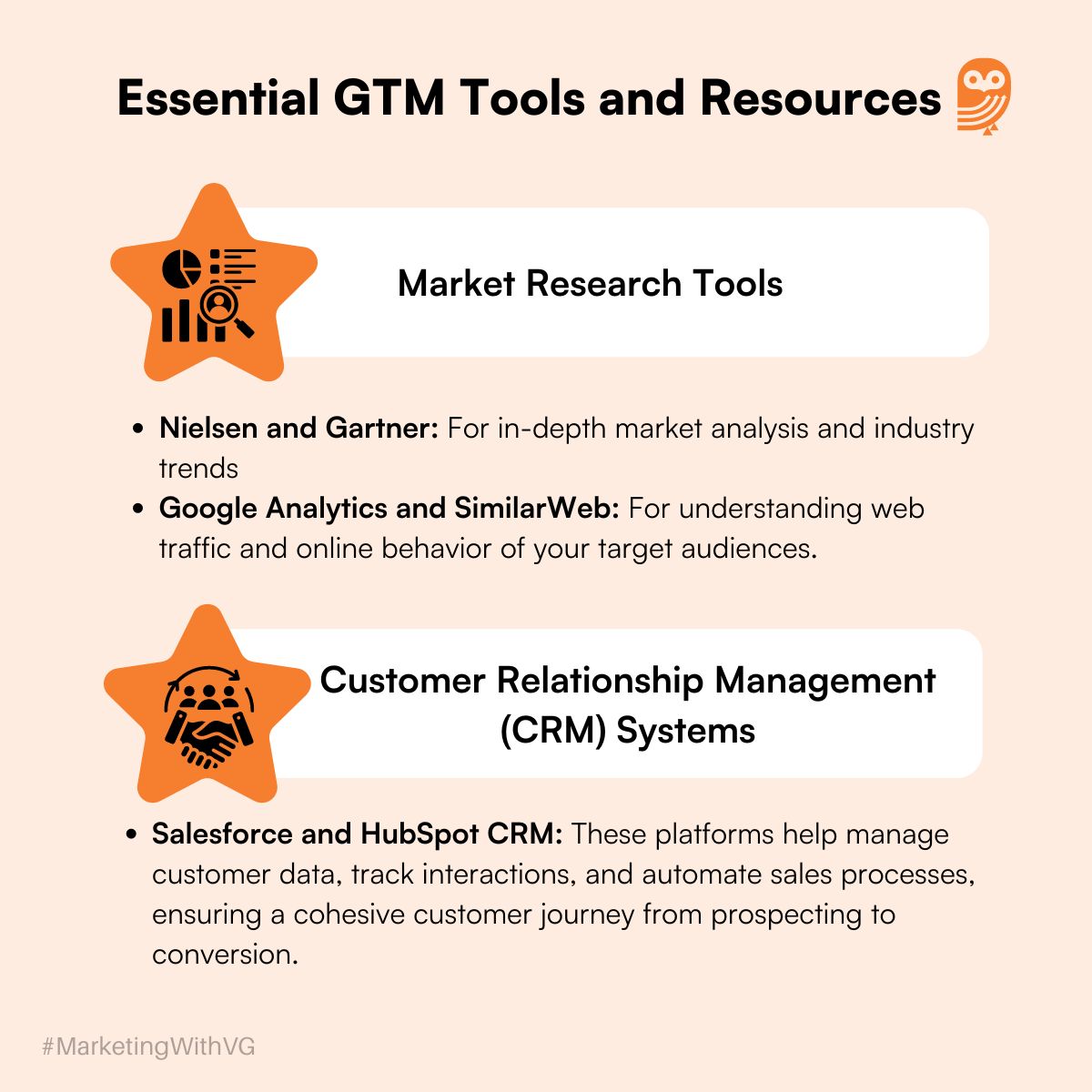
3. Project Management Tools
- Asana and Trello: Industry-leading project management platforms ideal for organizing GTM projects, tracking progress, managing tasks, and fostering collaboration among team members.
- Monday.com and Wrike: Versatile project management tools with customizable workflows, visual dashboards, and real-time collaboration features, enhancing productivity and efficiency in GTM execution.
4. Collaboration and Communication Tools
- Slack and Microsoft Teams: Versatile communication platforms that facilitate seamless collaboration across departments, ensuring alignment with GTM strategy goals, and fostering real-time communication and collaboration.
- Zoom and Google Meet: Video conferencing solutions that enable virtual meetings, webinars, and client presentations, enhancing remote collaboration and engagement in GTM activities.
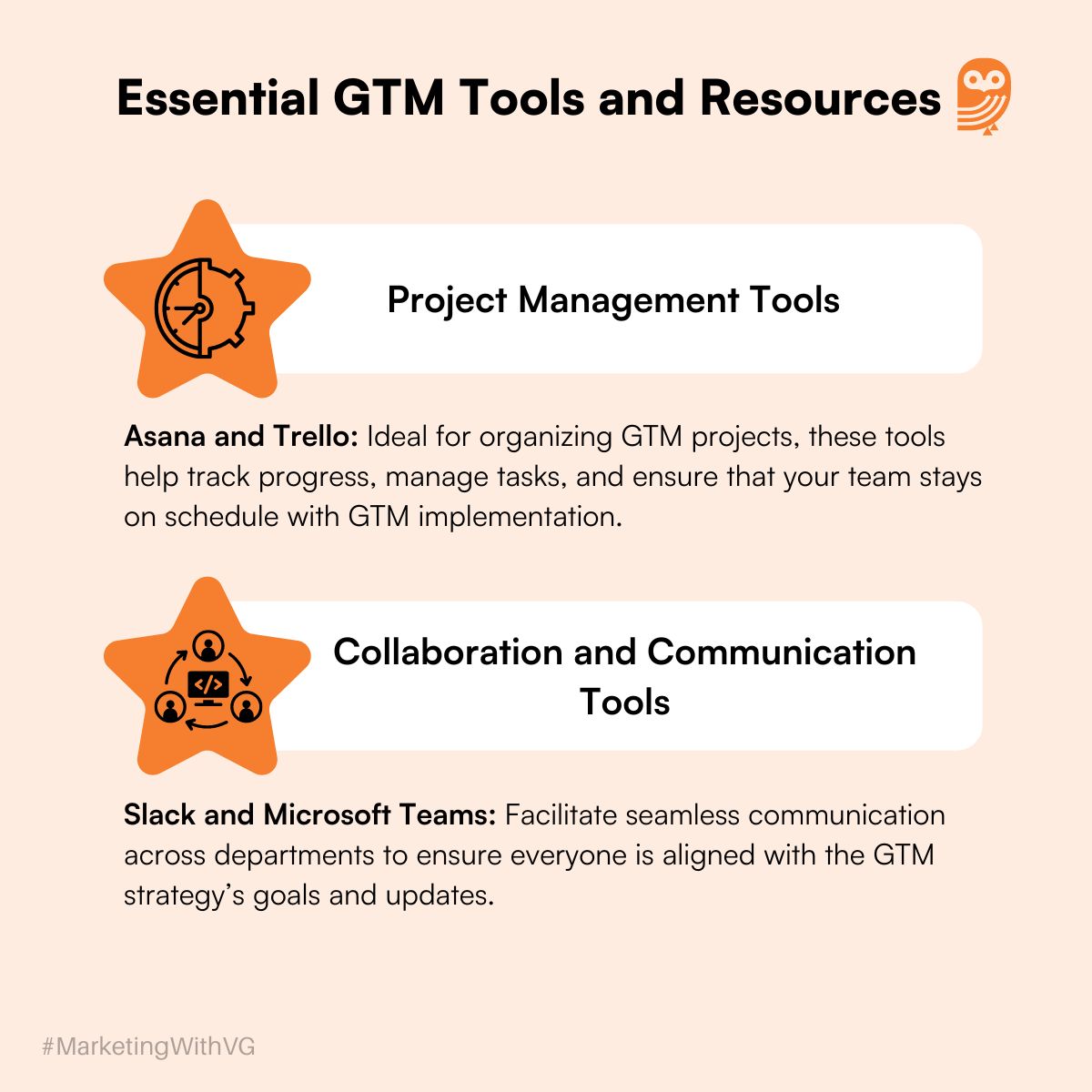
5. Analytics and Data Visualization Tools
- Tableau and Microsoft Power BI: Leading data visualization tools that convert complex data into actionable insights, essential for monitoring GTM performance, identifying trends, and making data-driven decisions.
- Google Data Studio and Domo: User-friendly data visualization platforms offering customizable dashboards, interactive reports, and real-time data integration, empowering businesses to gain deeper insights into GTM metrics and KPIs.
6. Email Marketing Automation Platforms
- Mailchimp and Marketo: Industry-leading email marketing automation platforms that enable businesses to automate campaigns, segment audiences, and personalize communication, nurturing leads effectively through the sales funnel.
- Constant Contact and Sendinblue: Affordable email marketing solutions offering intuitive drag-and-drop editors, robust automation workflows, and advanced analytics, catering to businesses of all sizes and budgets.
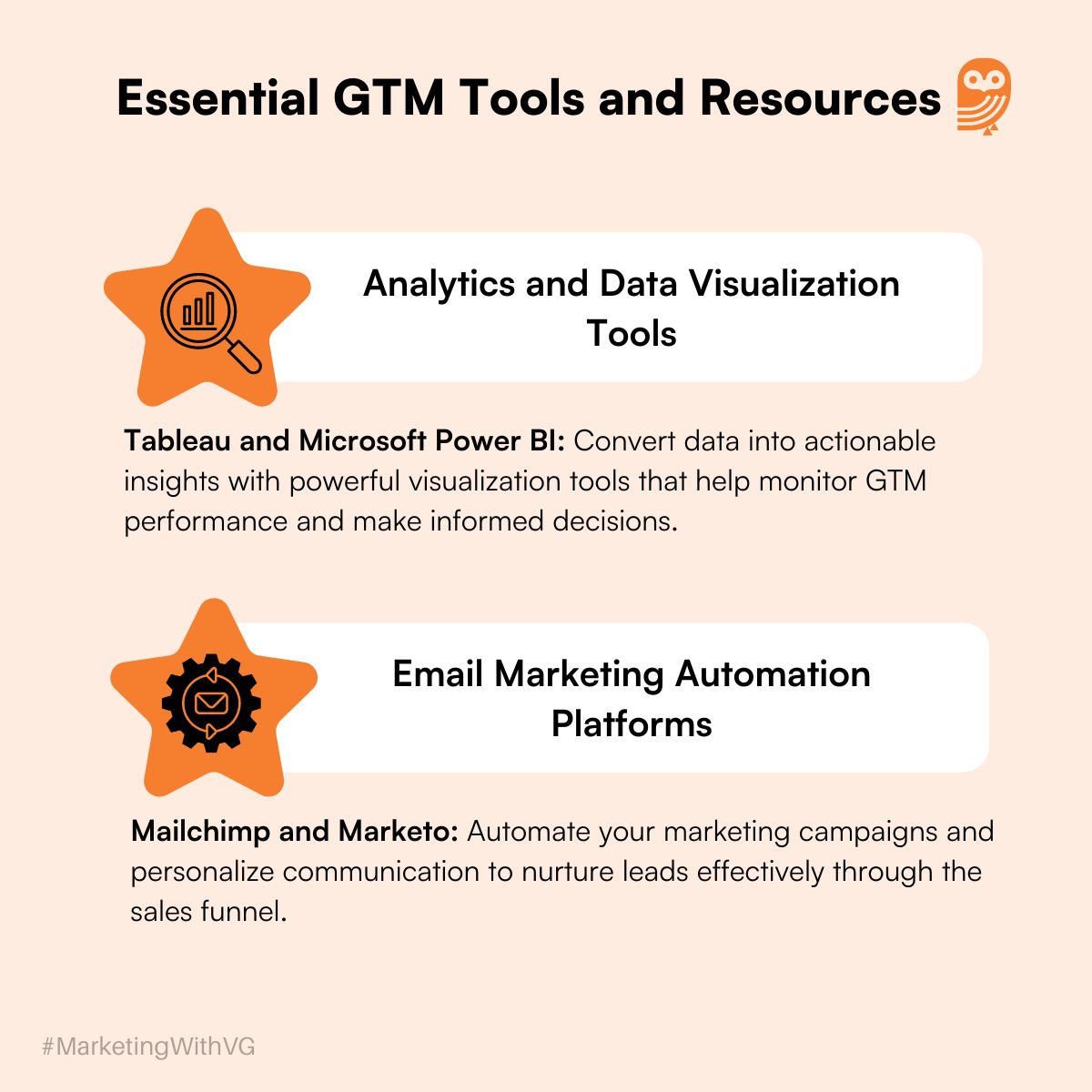
7. Social Media Management Tools
- Hootsuite and Buffer: Popular social media management platforms that streamline content scheduling, engagement tracking, and performance analytics, enhancing digital presence and audience engagement in GTM initiatives.
- Sprout Social and Socialbakers: Advanced social media management solutions offering AI-powered analytics, competitor benchmarking, and influencer identification features, enabling businesses to optimize social media strategies and drive meaningful engagement.
8. SEO and Content Marketing Tools
- SEMrush and Ahrefs: Leading SEO and content marketing platforms that offer comprehensive keyword research, backlink analysis, and competitive insights, empowering businesses to optimize online content and improve search engine rankings.
- Moz and BuzzSumo: All-in-one SEO and content marketing suites offering keyword tracking, content ideation, and influencer discovery tools, helping businesses create compelling content and enhance online visibility.
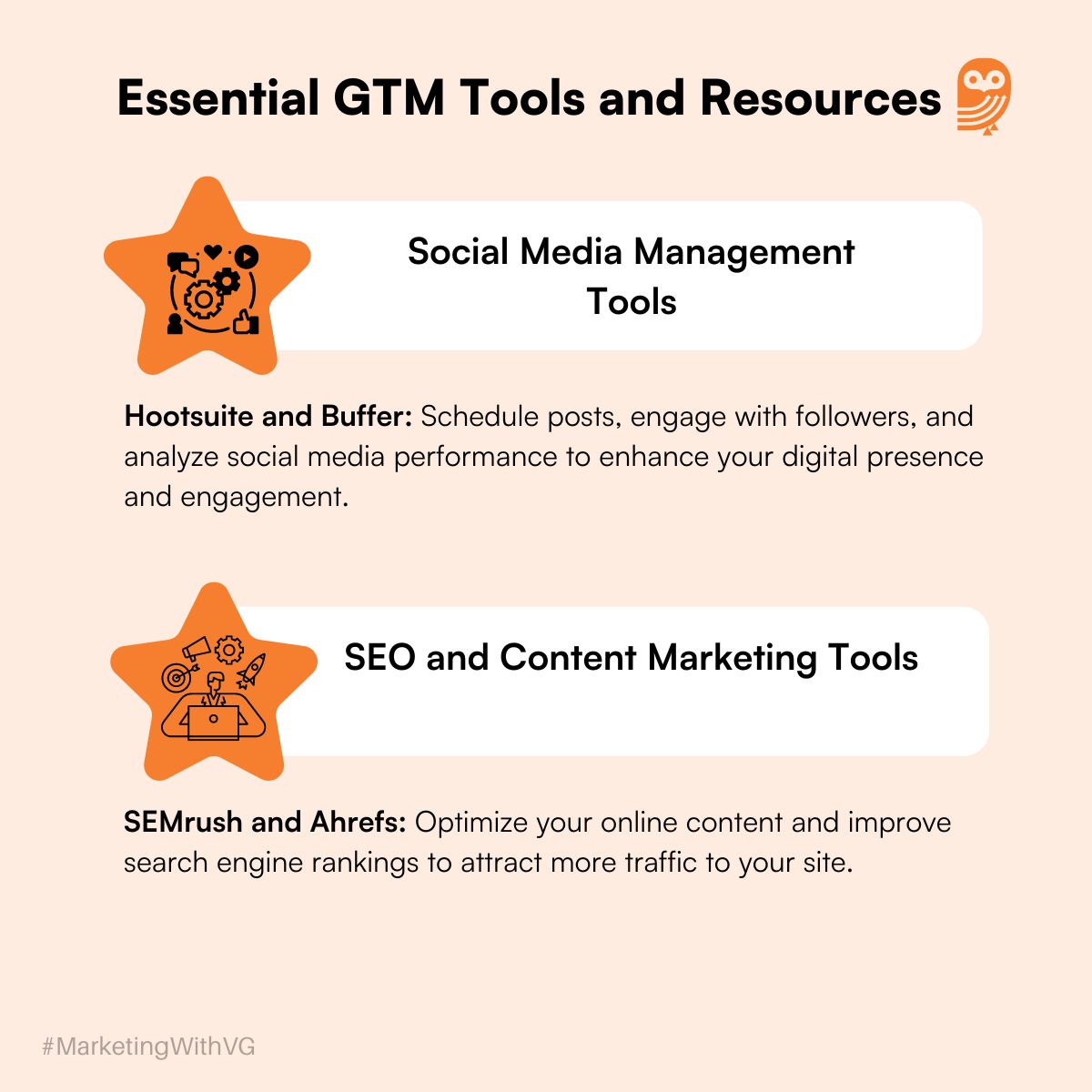
9. Feedback and Survey Tools
- SurveyMonkey and Google Forms: Versatile survey platforms that enable businesses to collect and analyze customer feedback, refine GTM approaches, and gain valuable insights into customer preferences and satisfaction levels.
- Typeform and Qualtrics: Interactive survey tools offering customizable templates, advanced logic branching, and real-time analytics, facilitating in-depth data collection and analysis for GTM optimization.
10. Financial Planning and Analysis Software
- QuickBooks and Xero: Leading financial planning and analysis (FP&A) software solutions that help businesses track GTM budgets, expenses, and financial forecasts, ensuring cost-efficiency and profitability in GTM execution.
- FreshBooks and Wave Financial: User-friendly accounting software platforms offering invoicing, expense tracking, and financial reporting features, catering to small and medium-sized businesses (SMBs) seeking simplified financial management solutions.
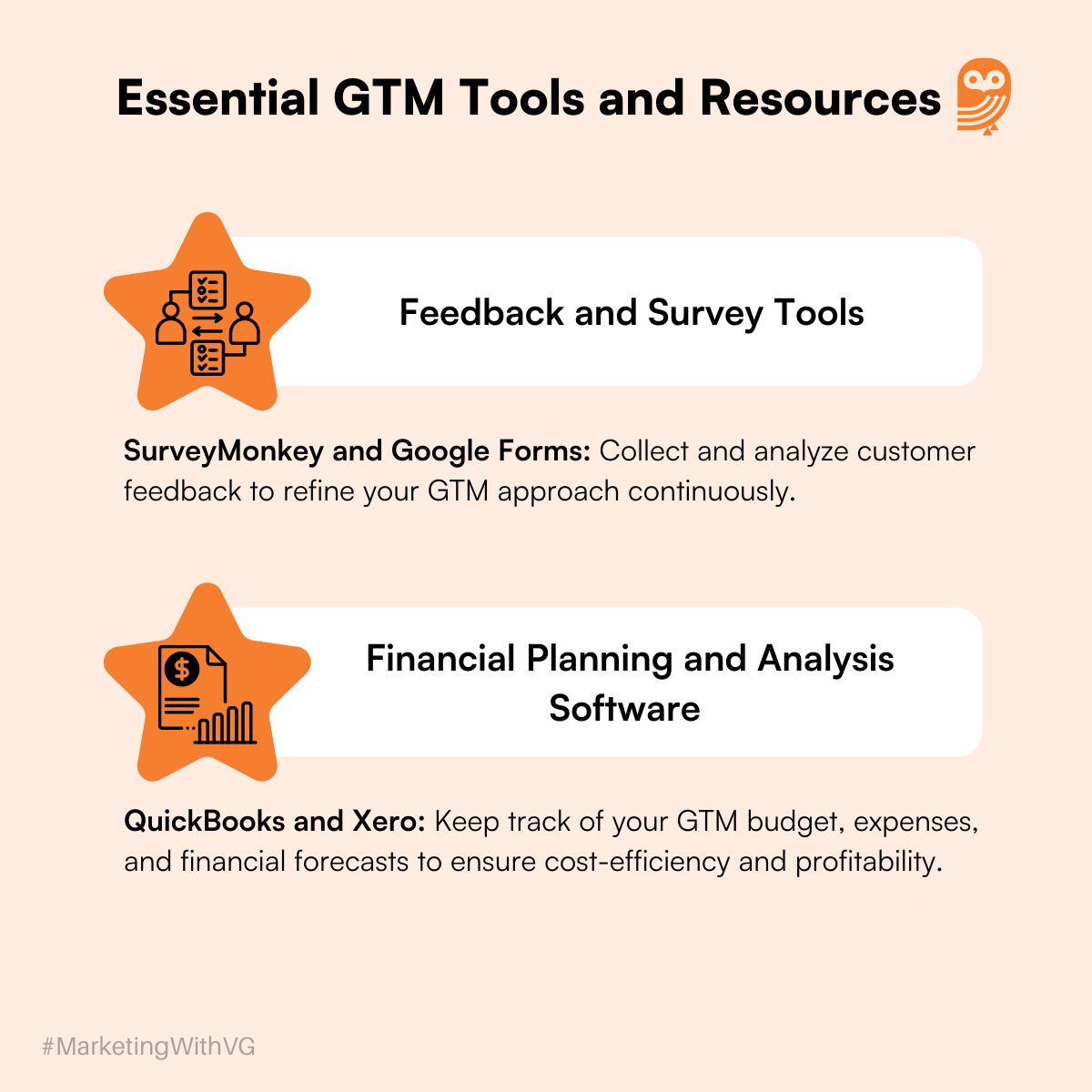
Example Use Case
Consider a tech startup preparing to launch a new mobile app. Leveraging tools like Zoho CRM for lead management, Monday.com for project planning, and Google Data Studio for analytics visualization can be instrumental. By integrating these tools into their workflows, the startup can streamline GTM processes, track performance metrics, and optimize customer engagement, ultimately driving successful app adoption and revenue growth.
Conclusion
As businesses continue to adapt to changing market dynamics and consumer behaviors, equipping your team with the right tools is paramount for executing a GTM strategy effectively. The importance of leveraging technology and resources for GTM planning and execution cannot be overstated. By leveraging the top must-have tools tailored to their specific needs and objectives, businesses can achieve greater efficiency, productivity, and effectiveness in their GTM initiatives. Whether it’s gaining insights into market trends, managing customer relationships, or optimizing digital presence, the right tools pave the way for strategic growth and competitive advantage. By embracing innovation and staying abreast of emerging trends, businesses can position themselves for success and drive sustainable growth in today’s dynamic business landscape.
Frequently Asked Questions (FAQs) about GTM Tools
Market research tools like Nielsen and Gartner provide valuable insights into industry trends and customer behavior, helping businesses make informed decisions and refine their GTM strategies.
CRM systems such as Salesforce and HubSpot CRM enable businesses to manage customer data, track interactions, and automate sales processes, ensuring a seamless customer journey from prospecting to conversion.
Project management tools like Asana and Trello help organize GTM projects, track progress, manage tasks, and foster collaboration among team members, ensuring efficiency and productivity in execution.
Email marketing automation platforms like Mailchimp and Marketo enable businesses to automate campaigns, segment audiences, and personalize communication, nurturing leads effectively through the sales funnel.
Social media management tools such as Hootsuite and Sprout Social streamline content scheduling, engagement tracking, and performance analytics, enhancing digital presence and audience engagement in GTM initiatives.
SEO and content marketing tools like SEMrush and Moz offer keyword research, backlink analysis, and content ideation features, empowering businesses to optimize online content and improve search engine rankings.
Feedback and survey tools such as SurveyMonkey and Typeform enable businesses to collect and analyze customer feedback, refine GTM approaches, and gain valuable insights into customer preferences and satisfaction levels.
Financial planning and analysis software like QuickBooks and FreshBooks help businesses track GTM budgets, expenses, and financial forecasts, ensuring cost-efficiency and profitability in GTM execution.

